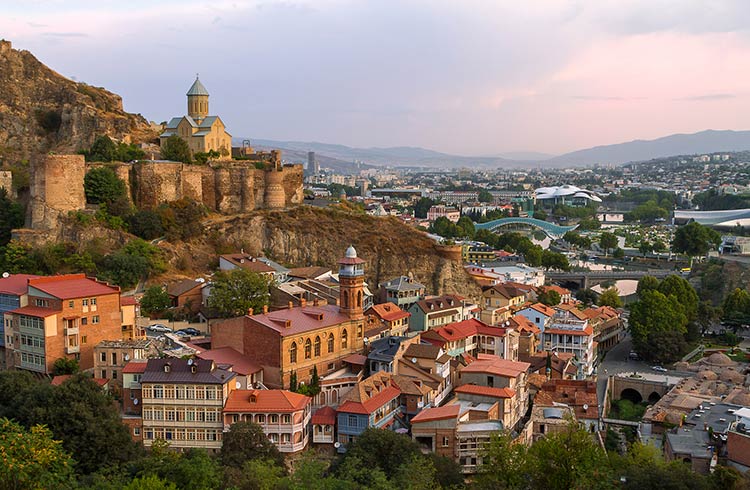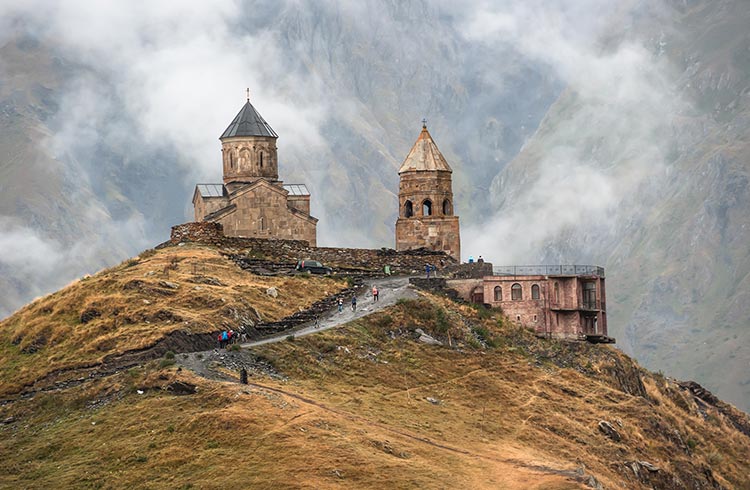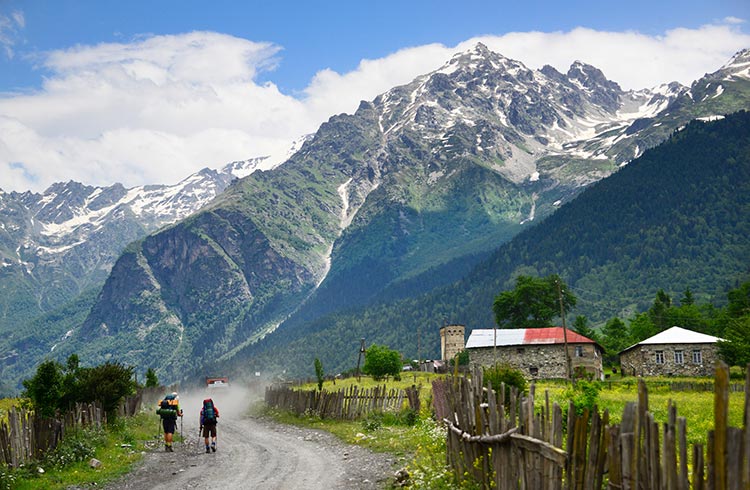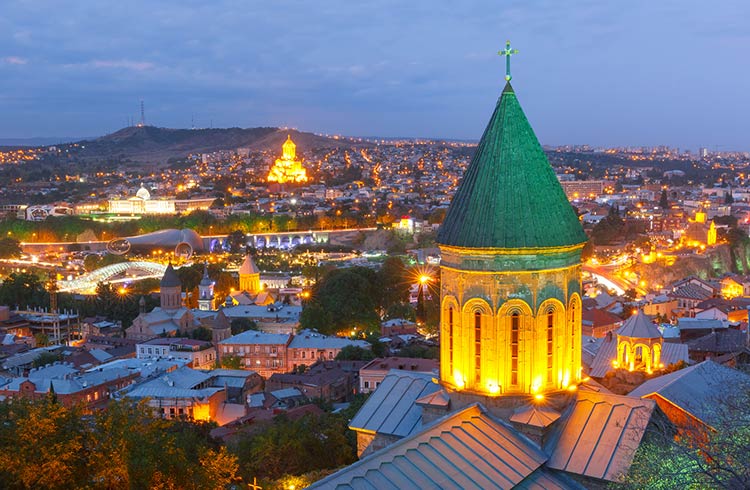Is Georgia Safe? 13 Essential Traveler Safety Tips
Is Georgia dangerous or safe for travelers? Paola Totaro shares her tips so you can stay out of trouble on your trip.
 Photo © Getty Images/Ozbalci
Photo © Getty Images/Ozbalci
From the velvet green vineyards of Khaketi and the snow-capped mounts of the Caucasus to the wacky Las Vegas-meets-the-Soviet Union architecture of Batumi on the Black Sea, Georgia is an environmentally diverse place to explore.
And if you’re an adventurous traveler, it is also one of the most exhilarating.
A former Soviet republic, Georgia sits at the crossroads between Asia, Europe, Russia and the Middle East, and has been fought over for millennia, coveted for its strategic position as well as its remarkable natural beauty, fertile valleys and near Mediterranean climate.
Deciding whether Georgia is part of Europe or Asia can depend on who you ask: as the Caucasus Mountains form the eastern border of Europe, Georgia, at least technically is located in Asia. Yet, have a chat to Georgians themselves and they will inevitably tell you that they are European and feel a part of Europe, culturally, physically and politically – even if their music, architecture and food clearly has Asian roots.
In 1917, after a revolution, Georgia battled to build the first republic in the world which was governed by a social-democratic ideology. That only lasted until 1921 when Russia invaded the country, and it wasn’t until 1991 that the fall of the former USSR meant Georgia regained its independence.
Since then, Georgia’s government has embarked on a sustained campaign to open the country to the world and tourism, seeing visitor numbers grow from less than 100,000 a year in 1996 to close to 7 million in 2018.
Indeed, Georgia has blossomed into a new, global tourism hotspot with visitors helping to reduce rates of poverty and contribute around 7.5% of the country’s GDP growth in 2018.
- Getting around Georgia safely
- Driving safely in Georgia
- Zero tolerance for drink driving
- Traveling around Georgia by trains
- Hiking safety in Georgia
- Safe snow sports in Georgia
- What is the weather like in Georgia?
- Crime in Georgia
- Is Georgia safe for LGBTQ+ travelers?
- Do I need cash in local currency in Georgia?
- Is traveling in Georgia difficult if you are disabled?
- Natural disasters in Georgia
- Is Georgia safe for women traveling alone?
- Listen to The World Nomads Podcast: Georgia
1. Getting around Georgia safely
The easiest and safest way to enter Georgia is by plane, and there are many reasonably priced flights from major European cities as well as from nations that share its borders, including Armenia and Azerbaijan in the southeast, and Turkey from the south.
At just under 27,000mi² (69,700km²), Georgia is a voyager’s paradise, a nation small enough to do a road trip by car and explore in a week if you’re pushed for time, and varied enough to devote a month or more if you really want the full Georgian experience.
Keep in mind that some government travel advisories, including the UK Foreign Office, advise that having travel insurance is important, as immigration authorities in Georgia may ask for evidence of valid health policy coverage on arrival.
2. Driving safely in Georgia
Georgia has a good network of roads – driving is on the right – and a national highway system pretty much radiates outward – north, south, west and east – across the country from the capital, Tbilisi. The main highway that crosses the mountains into Russia follows the same route that was described by the ancient Roman author, Pliny the Elder in the first century BC.
However, remember when driving, it can be difficult to navigate: the Georgian language has its own alphabet which is unique (its exact origin has never been established), and while it can be fun trying to decipher what looks like code when you’re walking or exploring by car on a road trip, it can be very difficult to follow signs and understand road maps.
Try to learn a few words of the language you know you will need or download an app onto your phone, such as Google Translate.
In the age of GPS and mobile phones, navigation is much less of a problem when you don’t know a language, but buying fuel can be challenging, and Georgians themselves will admit they are not the most law-abiding drivers in the world.
Speeding and a flouting of rules seem to be common, so driving is not for the faint-hearted. Speed limits in towns and cities are 38mi/h (60km/h) or 50mi/h (80km/h) outside – unless signs say otherwise.
It is compulsory to wear a seat belt in the front seat of a car in Georgia, and children under 12 must sit in the back.
3. Zero tolerance for drink driving
Georgians love a tipple, and this is no surprise considering the nation also happens to be the oldest wine producer in the world, demonstrated by an archeologist’s find of an unglazed clay amphora known as kveveri which still contained dregs and when tested, were dated to the 4th Century BC.
Georgian wineries still ferment their grapes this way, and some of the best-known vineyards are situated on stunning hillsides just two hours out of the capital Tbilisi, where you can also visit monasteries with 1,000-year histories or man-made cave villages in the unforgettable David Gareji Monasteries and hermitage.
However, if wineries are on your itinerary, hire a driver or use taxis because any kind of drink driving is banned in Georgia: this means zero tolerance to any alcohol in the blood at all when driving. It is an offense that carries stiff penalties.
In major cities like Tbilisi and Batumi, taxis are reliable and cheap, and most hotels and B&Bs will help you find a reliable driver and negotiate a reasonable day rate if you want to go exploring and not drive yourself. Drivers are fast and can be aggressive, so seatbelts are a must.
Keep in mind too that in many places, taxis don’t have meters, so you need to negotiate a price for your trip if it is a shorter one rather than a day rate. Again, your accommodation staff should be the best guide to prices and help you avoid being overcharged.
In many parts of Georgia, transport is dominated by a kind of mini-van which locals call marshrutkas. They’re a mix between public and private transport in the sense that they are much cheaper than a cab, don’t stop as often as buses, but they are also often crowded and drivers are known to speed. Add really bumpy roads and signage in an alphabet you don’t understand, and it becomes an adventure with a capital ‘A’.
4. Traveling around Georgia by trains
Rail transport in Georgia offers a mix of faster, more expensive modern trains and the much cheaper, slower ex-Soviet trains that link Georgian cities with each other and neighboring capitals, such as Baku in Azerbaijan.
For 10 months of the year, there’s no need to book, but in summer (June to August) it is best to pre-book seats and plan well in advance.
Rail travel is cheap, safe and only the normal precautions are needed. These include locking your compartment from the inside on sleeper trains, and being attentive to personal belongings is of course always advised.
5. Hiking safety in Georgia
Georgia can be heaven for hikers. Venture into picturesque, ancient high-altitude villages, ski fresh powder, go off-piste among pine forests or raft and kayak down pristine rivers (there are 25,000 rivers and streams in Georgia).
There is a growing variety of tours and specialist group holidays available to explore Georgia safely while not compromising on adventure. Some will tailor activities for individuals and provide local guides, while others offer group tours allowing you a taste of various sports, from rafting to hiking. If you are an experienced hiker, there are many trails to follow, and maps and guides are constantly improving. However, it’s always wise to hire a local guide and take advantage of local knowledge.
Vast swathes of the nation are connected by national parks. In the south, you can book riding holidays to explore the area of the Caucasus on horseback or camp in remote hilltop areas or stay with locals in a homestay.
A quick word of warning about snakes: they are common, particularly in early summer, and some are venomous. Medical facilities and anti-venom outside of the major towns can be hard to find, so be careful.
Always wear appropriate footwear: pack grippy, well-worn in hiking boots.

6. Safe snow sports in Georgia
Georgia is becoming popular among snowboarders and skiers, and this is a relatively new destination for these sports, but information about weather conditions in high altitude areas is still not reliable or up-to-date – so be conservative when making decisions in unpleasant weather.
Safety standards for adventure sports can also be inconsistent in Georgia, so do your research and try to use local, experienced guides if venturing off the beaten track.
But before you give in to the excitement of exploring new frontiers and buy your plane tickets, what are the downsides?
7. What is the weather like in Georgia?
The ideal time to visit most of the country is between May and July and early September to October when it’s warm, sunny and not too hot or humid. In some parts of the country, temperatures reach 104ºF (40ºC) in high summer, a great time to visit the mountains but not the lower areas.
In the east, winter temperatures are often below freezing, while around the Black Sea, the microclimate can be temperate.
Georgia also happens to be one of the wettest countries in the region, which makes it incredibly lush and beautiful, but in winter, ice and heavy snow make it hazardous – particularly in mountain areas, so it’s important to be properly equipped with chains on tires to drive safely.
8. Crime in Georgia
While general crime levels are low compared to large European and American cities, it is always smart, particularly in crowded areas, to be extra careful with your belongings – wallets, passports, money, cameras and phones in particular.
Avoid wearing obvious signs of wealth such as expensive jewelry or watches, as incidents of pickpocketing and burglary targeting visitors have been reported, and these items will make you a target.
9. Is Georgia safe for LGBTQ+ travelers?
LGBTQ+ travelers are unlikely to attract hostility if you are discreet: the reality here is that while homosexuality is legal and Georgian lawmakers have moved recently to legislate against discrimination, social acceptance is not complete and the traditional, Christian values of the country make it a taboo subject in some places.
Travel sites, such as Lonely Planet, report that two men or women sharing a bed is often not construed as having a sexual motive, and may be considered less risqué than an unmarried heterosexual couple seen to be doing the same.
Tbilisi, for example, is a lively, cosmopolitan city, but in rural areas, discretion is key as their attitudes are much more conservative.
All visitors should be particularly considerate and aware of cultural sensitivities around churches and religious sites. During a visit to the nunnery in the hills of Batumi this summer, we were provided with veils by a disapproving caretaker nun and learned next time to ensure our bare heads and arms were properly covered before entering chapels or churches.
10. Do I need cash in local currency in Georgia?
Georgian currency is called the lari. Georgian law requires all prices to be expressed in lari and all goods and services to be paid in the national currency.
Occasionally you might see prices quoted in Euros or US dollars, and both credit and debit cards are accepted in the major cities and towns. However, in regional areas ATMs are less easy to find, and if you are traveling in remote or rural areas, make sure you have enough cash.
11. Is traveling in Georgia difficult if you are disabled?
The harsh reality is that Georgian accessibility standards are very different from those required by the UK or EU, and from what I saw, anecdotally at least, public transport did not appear to be particularly accessible for disabled travelers. That said, the Georgians are kind, hospitable and helpful, so a helping hand would never be far away.
12. Natural disasters in Georgia
Georgia is affected by seismic activity, and while small earthquakes are relatively common, there has not been a significant earthquake since 2009, which struck about 99mi (160km) southwest of Tbilisi, and measured 6.2 on the Richter scale.
Safety rules apply:
- Drop (down to your knees)
- Cover (your head and neck with your arms, and if a sturdy table or desk is nearby, take shelter)
- And hold on (bend forward, hands and arms holding onto your neck).
- If you are outdoors, stay away from buildings but do not run outdoors and do not take shelter in a doorway.
13. Is Georgia safe for women traveling alone?
Georgia is a relaxed place to travel around, and I certainly felt as safe, if not safer in Batumi for example, than I sometimes feel walking in London late at night.
Still, there are rules that I live by as a woman wherever I am, which are basically common-sense and these apply in Georgia too.
In general, try not to walk unlit or unpopulated areas late at night, be aware of offers of drinks from strangers, try not to leave your drink unattended if you’re in a bar alone and be discreet with jewelry or cash.
Listen to The World Nomads Podcast: Georgia
Have you been to Georgia? Share your tips below!
Related articles
Simple and flexible travel insurance
You can buy at home or while traveling, and claim online from anywhere in the world. With 150+ adventure activities covered and 24/7 emergency assistance.
Get a quote

No Comments